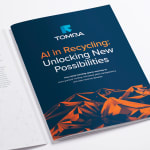
Tomra Recycling has published a free eBook titled "AI in Recycling: Unlocking New Possibilities" that examines the evolving role of artificial intelligence, with a focus on deep learning, in advancing recycling and material circularity. The guide aims to demystify deep learning by explaining its mechanisms and showing how training large datasets enables the separation of materials that were previously hard to classify. It traces the progression of sorting technologies from manual processes to the prospect of fully autonomous, AI-driven systems, while outlining the core concepts that underpin current approaches. A central theme is the synergy of deep learning with traditional sensors in optical sorters, which is unlocking more granular sorting, greater plant transparency and new revenue streams. The eBook also presents Tomra’s growing portfolio of deep learning applications with real-world examples, and discusses how AI can help address emerging regulatory requirements such as the Packaging and Packaging Waste Regulation by enabling the advanced sorting capabilities needed to meet circular economy targets.
Deep learning in optical sorting
According to the publication, combining deep learning with established sensor technologies is enhancing recovery of valuable resources and improving material purity. Examples include Tomra’s award-winning GAINnext for food-grade plastics recovery for PET, PP and HDPE, as well as PET and paper cleaning and high-purity recovery of aluminum used beverage cans (UBC). The eBook also points to the capabilities of the PolyPerception AI-based waste analyzer, which provides real-time, end-to-end object tracking and classification of waste streams.
Operational and regulatory drivers
Readers are presented with the tangible benefits of deep learning-based solutions and their impact on plant performance and market access:
- enhanced flexibility in handling complex material streams
- creation of new high-value material fractions and revenue opportunities
- superior sorting accuracy and higher output purity
- advanced plant automation and optimized processes
The guide situates these developments within the context of evolving legislation such as the Packaging and Packaging Waste Regulation, noting the need for advanced sorting capabilities to achieve circular economy objectives. Looking ahead, it outlines a vision in which AI supports fully transparent and self-optimized recycling plants.
Industry perspective
Fabrizio Radice, SVP and Head of Sales and Marketing at Tomra Recycling, said: "We believe our new eBook will serve as a valuable resource for the global recycling community, providing a clear understanding of how deep learning is not a futuristic concept, but rather a tangible solution that is already delivering significant benefits and paving the way for a truly circular economy. By demystifying the technology and showcasing real-world applications, our aim is to encourage recyclers and processors to embrace the transformative potential of AI and explore how it can help them achieve their operational goals, meet rising demand for recycled content and take advantage of new, expanded market opportunities.".

Tomra’s new eBook explores the role of AI in revolutionizing the global recycling industry.



